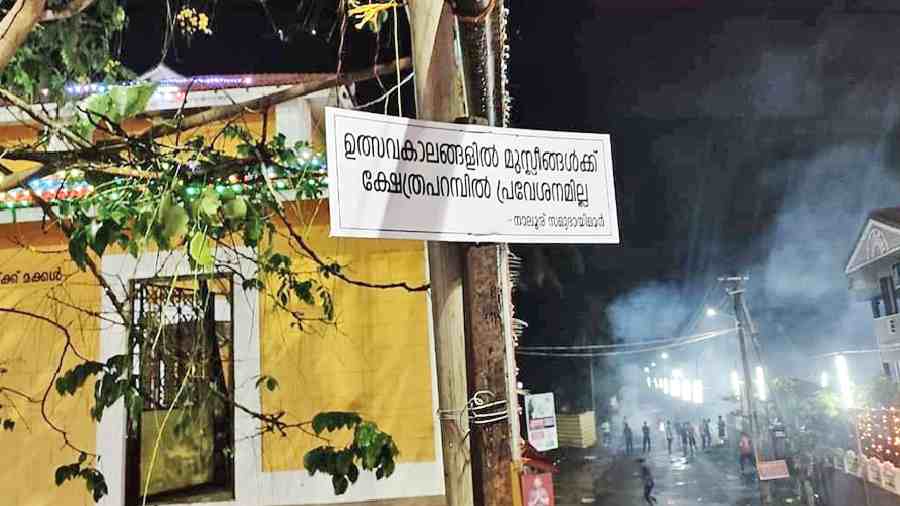A temple committee in Kerala has decided to drop a signboard disallowing Muslims at its annual festival following a controversy as most places of worship in the state do not have any such restrictions.
The committee that governs Malliyottu Palottukavu at Payyannur in Kannur district decided on Monday to drop the signboard that is installed before the five-day annual festival held in April each year.
The decision coincided with Kerala chief minister Pinarayi Vijayan reminding Union home minister Amit Shah about the communal harmony in his state compared with neighbouring Karnataka, which has been a hub of violent communal disturbances.
Vijayan’s retort followed Shah cautioning the people of Karnataka that “there is Kerala near you; I don’t want to say much” in his poll pitch at a BJP rally. His allusion was to the presence of some radical Muslims in Kerala. The remarks triggered a huge controversy and protests in Kerala where CPM leaders demanded an apology from Shah over his attempt to stereotype an entire state and its people.
“People of all faiths live peacefully in Kerala. Is that the situation in Karnataka? Christians and other minority communities have faced several attacks in Karnataka. But there is no communal disturbance in Kerala,” Vijayan had said in his counter to Shah’s remarks.
The Palottukavu temple drew flak last year when a board stating “Muslims have no entry during the festival” appeared outside its premises.
While it has been a practice for several decades, the board received a lot of flak after some social media users came out against isolating one community, that too when people from all sections donate money for the various cultural events at the festival.
“We took a decision that this board would have no place in a temple whose traditions are secular,” a temple committee member, who declined to be named based on the longstanding practice of all media statements coming from the patriarch of the shrine, told The Telegraph on Tuesday.
The temple is renowned for its Theyyam, a secular ritualistic dance commonly performed in the north Kerala districts of Kannur and Kasaragod where the characters are believed to possess divine attributes during the performance.
Several Hindu shrines in the two districts even have several variants of Mappila (Muslim) Theyyam, which is seen as an example of communal harmony.
The bordering southern Karnataka district of Dakshina Kannada also has a similar tradition known as “Bhoota Kola”, portrayed in the recent Kannada film Kaantara.
“Although members of all communities have been freely participating in the festival held on the premises of the temple, such a board expressly prohibiting one community is an insult to them. So we decided such a practice won’t have any place in our temple any more,” the temple functionary said.
The issue of allowing entry to Muslims for the temple festival has already led to an arrest on Monday. Local police arrested Sangh parivar supporter Kaliyadan Prakashan, 46, over his Facebook post on the issue. He was booked under penal sections for trying to foment communal disturbances and rioting and sent to 14-day judicial remand.
CPM area secretary of Payyannur, K. Padmanabhan, said the practice of prohibiting Muslims started several decades ago.
“Such inhumane practices don’t have any place in Kerala, especially since it is a festival where several secular cultural programmes and fairs are held each year,” he told this newspaper.
The CPM had intervened in the matter when it became a hotly discussed issue last year.
“Everyone should follow the example set by this temple since humanity is way above any manmade divisions,” he added.
While temples such as the Guruvayur Sree Krishna Temple are among the few that still do not allow entry to non-Hindus, a majority of Hindu temples in Kerala have no such restrictions.
The Sabarimala temple has been a stellar example where devotees first pray at the Vavar Mosque of Vavarswamy before entering the hill shrine of Swamy Ayyappan.











